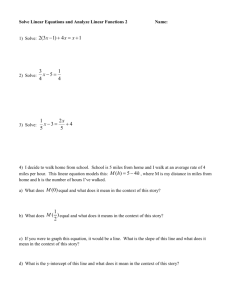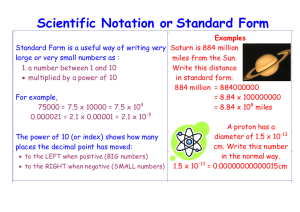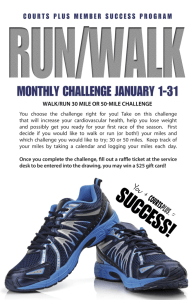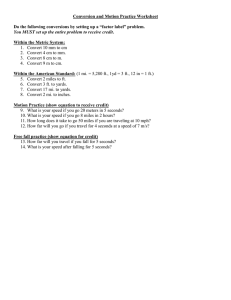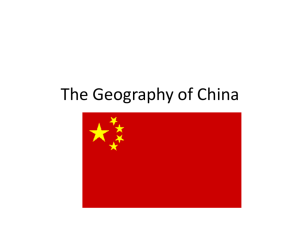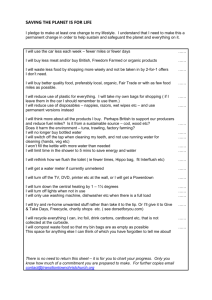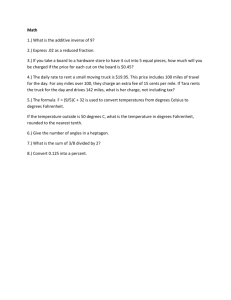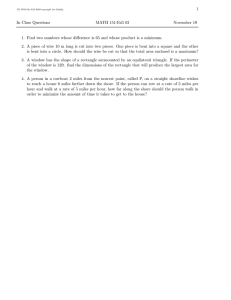World Geography Atlas Activities Worksheet
advertisement
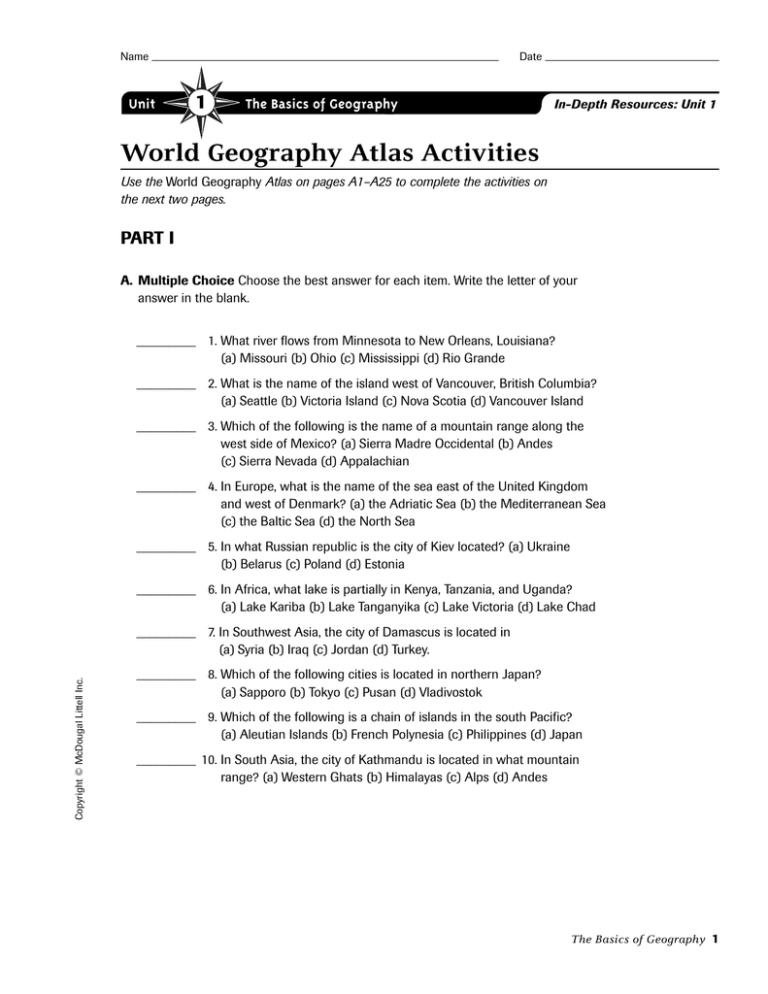
Name Unit Date 1 The Basics of Geography In-Depth Resources: Unit 1 World Geography Atlas Activities Use the World Geography Atlas on pages A1–A25 to complete the activities on the next two pages. PART I A. Multiple Choice Choose the best answer for each item. Write the letter of your answer in the blank. _________ 1. What river flows from Minnesota to New Orleans, Louisiana? (a) Missouri (b) Ohio (c) Mississippi (d) Rio Grande _________ 2. What is the name of the island west of Vancouver, British Columbia? (a) Seattle (b) Victoria Island (c) Nova Scotia (d) Vancouver Island _________ 3. Which of the following is the name of a mountain range along the west side of Mexico? (a) Sierra Madre Occidental (b) Andes (c) Sierra Nevada (d) Appalachian _________ 4. In Europe, what is the name of the sea east of the United Kingdom and west of Denmark? (a) the Adriatic Sea (b) the Mediterranean Sea (c) the Baltic Sea (d) the North Sea _________ 5. In what Russian republic is the city of Kiev located? (a) Ukraine (b) Belarus (c) Poland (d) Estonia _________ 6. In Africa, what lake is partially in Kenya, Tanzania, and Uganda? (a) Lake Kariba (b) Lake Tanganyika (c) Lake Victoria (d) Lake Chad Copyright © McDougal Littell Inc. _________ 7. In Southwest Asia, the city of Damascus is located in (a) Syria (b) Iraq (c) Jordan (d) Turkey. _________ 8. Which of the following cities is located in northern Japan? (a) Sapporo (b) Tokyo (c) Pusan (d) Vladivostok _________ 9. Which of the following is a chain of islands in the south Pacific? (a) Aleutian Islands (b) French Polynesia (c) Philippines (d) Japan _________ 10. In South Asia, the city of Kathmandu is located in what mountain range? (a) Western Ghats (b) Himalayas (c) Alps (d) Andes The Basics of Geography 1 Date Name Unit 1 The Basics of Geography In-Depth Resources: Unit 1 B. True/False Read the statements below and evaluate their accuracy. In the blank before each item, write T if the statement is true and F if it is false. _________ 1. The Grand Canyon is over 400 miles north of Phoenix, Arizona. _________ 2. In South America, Rio de Janeiro is the capital of Argentina. _________ 3. The Danube River flows from southern Germany into the Black Sea. _________ 4. Vladivostok is a Russian city located on the Sea of Japan. _________ 5. In Africa, the Blue Nile and the White Nile merge into the Nile River. _________ 6. The Kalahari Desert is located in northern Africa. _________ 7. In Southwest Asia, the Persian Gulf lies between Saudi Arabia and Iran. _________ 8. In India, Bombay is more than 500 miles northwest of Madras. _________ 9. In East Asia, Seoul is a city located in North Korea. _________ 10. In Southeast Asia, Singapore is a city located on the tip of the Malaysian Peninsula. C. Matching Match the term in the second column with the description in the first column. Write the letter of your answer in the blank. _________ 1. the capital of North Carolina a. Madrid _________ 2. Toronto, Canada, is located on this body of water b. Huang He c. Pakistan d. Raleigh _________ 4. a large city in central Spain e. Urals _________ 5. a mountain range in west central Russia f. Great Barrier Reef _________ 6. in Africa, a large island west of Mozambique g. Venezuela _________ 7. the large body of water north of Turkey _________ 8. the country northwest of India _________ 9. a river that flows through China _________ 10. located off the northeast coast of Australia 2 UNIT 1 h. Madagascar i. Lake Ontario j. Black Sea Copyright © McDougal Littell Inc. _________ 3. the country north of Brazil and east of Colombia Name Unit Date 1 The Basics of Geography In-Depth Resources: Unit 1 Part II Imagine that you are traveling down a major river for each of the geographic regions. Below are descriptions of your trips. Using the World Geography Atlas on pages A1–A25 in your textbook, fill in the blanks for each description. A. THE UNITED STATES AND CANADA: MISSISSIPPI RIVER You start your trip in St. Paul, Minnesota, which is about (1)_______________ miles from the source of the Mississippi River. After traveling down the river for over 500 miles, you reach the large city of (2)_______________, Missouri. You continue on to Cairo, Illinois. A few miles past this town, you arrive at the place where another large river called the (3)_______________ River flows into the Mississippi. Continuing down the Mississippi for over 600 more miles, you finally reach the mouth of the river at the city of (4)_______________, Louisiana. Here, the Mississippi flows into a large body of water called the (5)_______________. B. LATIN AMERICA: AMAZON RIVER You start this journey at the mouth of the Amazon River where it flows into the (1)_______________ Ocean. After voyaging up the river for about 200 miles, you reach the place where the (2)_______________ River merges with the Amazon River. You continue on the Amazon for almost 400 more miles and arrive at the town of (3)_______________. After getting much needed supplies, you decide to travel to the source of the Amazon. During your trip so far, you have been traveling through the country of (4)_______________. However, to the reach the source of the Amazon you have to pass through Colombia and enter the country of (5)_______________. Copyright © McDougal Littell Inc. C. EUROPE: RHINE RIVER To reach the Rhine River, you set sail at the mouth of the Waal River in the city of (1)_______________, the Netherlands. After traveling about 75 miles on the Waal, you arrive at the location where it merges with the Lek River to form the Rhine. A few miles past this location you reach the city of Cologne and then, about 100 miles further, the large city of (2)_______________, Germany. About 80 miles beyond this city, the Rhine forms the borders of (3)_______________ and (4)_______________. You stop for some apple strudel in Strasbourg and then travel to the Rhine’s source, located in the country of (5)_______________. D. RUSSIA AND THE REPUBLICS: VOLGA RIVER You reach the source of the Volga River by traveling about (1)_______________ miles north from Moscow. You cruise in an easterly direction on this winding river for about 380 miles and arrive at the large city of (2)_______________. Your journey on the Volga continues east for a little over 200 miles. Then the river bends south. At this location the Volga is about 325 miles west of the mountain range called the (3)_______________. After traveling another 600 miles, you reach the mouth of the Volga where it empties into the (4)_______________. The Basics of Geography 3 Date Name Unit 1 The Basics of Geography In-Depth Resources: Unit 1 E. AFRICA: NILE RIVER Your trip up the Nile, the longest river in the world, starts at its mouth, a rich delta with many tributaries that flow into the (1)_______________ Sea. These tributaries merge at the ancient city of (2)_______________, Egypt. You continue up the river for about 350 miles and reach the city of (3)_______________. After visiting the nearby ruins at Thebes, you sail to Barbar. During this leg of your journey, you pass by the (4)_______________ Desert to the east. You then pilot your boat over 200 miles to Khartoum, Sudan, where the Nile divides into the (5)_______________ and the (6)_______________. Continuing down the (7)_______________ Nile you eventually reach the Nile’s source in Burundi. F. SOUTHWEST ASIA: EUPHRATES RIVER You begin this trip at the source of the Euphrates in the country of (1)______________. After navigating your boat down the river for several days, you reach the town of Dayr az Zawr in the country of (2)_______________. Over 300 miles later you arrive in Karbala, which is about (3)_______________ miles southwest of Baghdad. You journey on to Al Basrah, where the Euphrates joins the (4)_______________ River and continues to flow into a large body of water called the (5)_______________. G. SOUTH ASIA: GANGES RIVER After a difficult climb you reach the source of the Ganges in the mountain range called the (1)_______________. You pilot your vessel about 400 miles down the river and reach the large city of (2)_______________, India. You continue to travel on the river through the cities of Allahabad, Varanasi, and Patna and then enter the country of (3)_______________. Finally, you reach the mouth of the Ganges where it flows into a large body of water called the (4)_______________. Your journey up the 3,000-mile-long Huang He begins at its mouth, which you approach from the (1)_______________ Sea. Despite its length, the entire river is within the country of (2)_______________. After voyaging about (3)_______________ miles on the Huang He you reach a point where the river turns sharply north. You journey on for about 300 miles and then sail past the largest man-made structure in the world, the (4)_______________. The river winds west again for a ways and then southwest. Eventually you reach the source of the Huang He, located in (5)_______________ terrain. I. SOUTHEAST ASIA, OCEANIA, AND ANTARCTICA: MEKONG RIVER You travel to the source of the Mekong River in the country of (1)_______________. Navigating your boat over 900 miles down the Mekong, you reach where the river forms the borders of (2)_______________ and (3)_______________. Nearly 400 miles further, you arrive at the city of Yiangchan. Beyond this city you find that the Mekong forms the borders of (4)_______________ and (5)_______________ for about 500 miles. You then follow the river into Laos. Over the next 400 miles, you journey down the Mekong through the country of (6)_______________ and into Vietnam. Here you arrive at the mouth of the river where it empties into the (7)______________ Sea. 4 UNIT 1 Copyright © McDougal Littell Inc. H. EAST ASIA: HUANG HE
